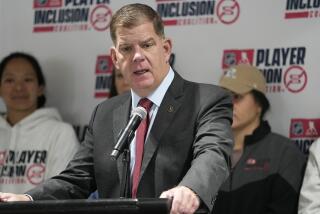NHL’s Union Chief Goodenow Resigns
- Share via
Bob Goodenow helped NHL players gain unprecedented riches over the last decade, ending their servitude to an old boys’ club of miserly owners.
But the sport’s economics changed, and Goodenow’s opposition to salary restraints and his mistrust of the new breed of business-oriented owners didn’t waver until his constituents had lost millions of dollars in a labor dispute that crippled the league.
On Thursday, a week after the NHL Players’ Assn. reluctantly approved a collective bargaining agreement that includes a salary cap and linkage to league-wide revenue, Goodenow resigned as the union’s executive director and was replaced by Ted Saskin, his second-in-command. Goodenow said he’d planned to leave in a few years but moved up the date after meeting with the union’s executive committee.
“I agreed with the committee when they felt that at this time it would be better to accelerate the transition,” he said at a news conference in Toronto. “I didn’t want there to be a cumbersome handoff of the baton.
“Looking to the future, this is the right decision to be made and the right time to make it.”
Goodenow, who was a labor lawyer and agent in Detroit before he succeeded Alan Eagleson in 1992, didn’t take a paycheck during the 310-day lockout. He said he’d reached “an accommodation” on his contract, which had less than three years remaining at a reported $2.5 million a year.
He said he had no plans beyond resting and grieving over the death of his mother last week.
“I don’t believe I’ll be working in professional hockey in the foreseeable future, by choice,” said Goodenow, who led players to a 10-day strike on the eve of the 1992 playoffs and through a lockout that curtailed the 1994-95 season.
He acknowledged that the new deal “does not have all the components we talked about at the outset” but cautioned against immediately judging it. He also disputed rumors that he didn’t support it and wasn’t involved in the final negotiations, saying he had coordinated the union’s strategy based on data gathered by Saskin and other negotiators during small-group sessions with NHL representatives.
“I believe it can and will work well,” he said. “No, I don’t think this is a personal failure at all.”
Yet, his power base had clearly eroded as owners defied his predictions and held firm in their quest for sweeping cost controls. King forward Sean Avery became one of Goodenow’s most vocal critics, saying Goodenow had brainwashed players into believing they’d avoid a cap when the odds were prohibitively against them.
“It wasn’t like I thought we should take Bob’s head off. I was just looking for somebody to admit we couldn’t win, and figure out where we should go from there,” Avery said. “We weren’t strong enough, but maybe we will be in six or seven years.”
Avery said he was shocked to learn of Goodenow’s resignation after having heard that most players supported him last week.
“I didn’t think anything would come of it as far as Bob leaving,” Avery said. “I think Bob’s done a lot of really amazing things for players. Me, as an individual, I was just looking for him to say, ‘You know what, I underestimated the whole situation. You guys put me in power. What do you want me to do?’ ”
King left wing Luc Robitaille said it was “probably time” for Goodenow to step down.
“I’m not sure he was a big fan of what we were trying to accomplish,” Robitaille said. “There was some miscalculation, but he was not alone.”
Tom Laidlaw, an agent based in Connecticut, said the bluntness that Goodenow used to advance the players’ cause might have contributed to his undoing.
“The pendulum swung so far toward players that owners decided they just couldn’t continue,” Laidlaw said in a telephone interview. “You’ve got a guy that wants total control, in Bob, and the owners are pushing back. ... It didn’t turn out to be the right strategy. But to be honest, maybe it wouldn’t have mattered.”
Allan Walsh, an agent who lives in Los Angeles, praised Goodenow for restoring the union’s credibility and exploring new revenue streams after Eagleson’s ouster. Eagleson admitted to stealing players’ pension money and disability insurance settlements and served six months in a Canadian prison.
“Every living, breathing NHL player owes a big thank you to Bob Goodenow,” Walsh said. “He took over a union reeling from Alan Eagleson’s mismanagement and turned the organization into the Rolls-Royce of players’ unions. ...
“While a lot has been said and written about the recent labor dispute that cost us a full NHL season, in the end, I think the players will miss him a great deal.”
More to Read
Go beyond the scoreboard
Get the latest on L.A.'s teams in the daily Sports Report newsletter.
You may occasionally receive promotional content from the Los Angeles Times.







